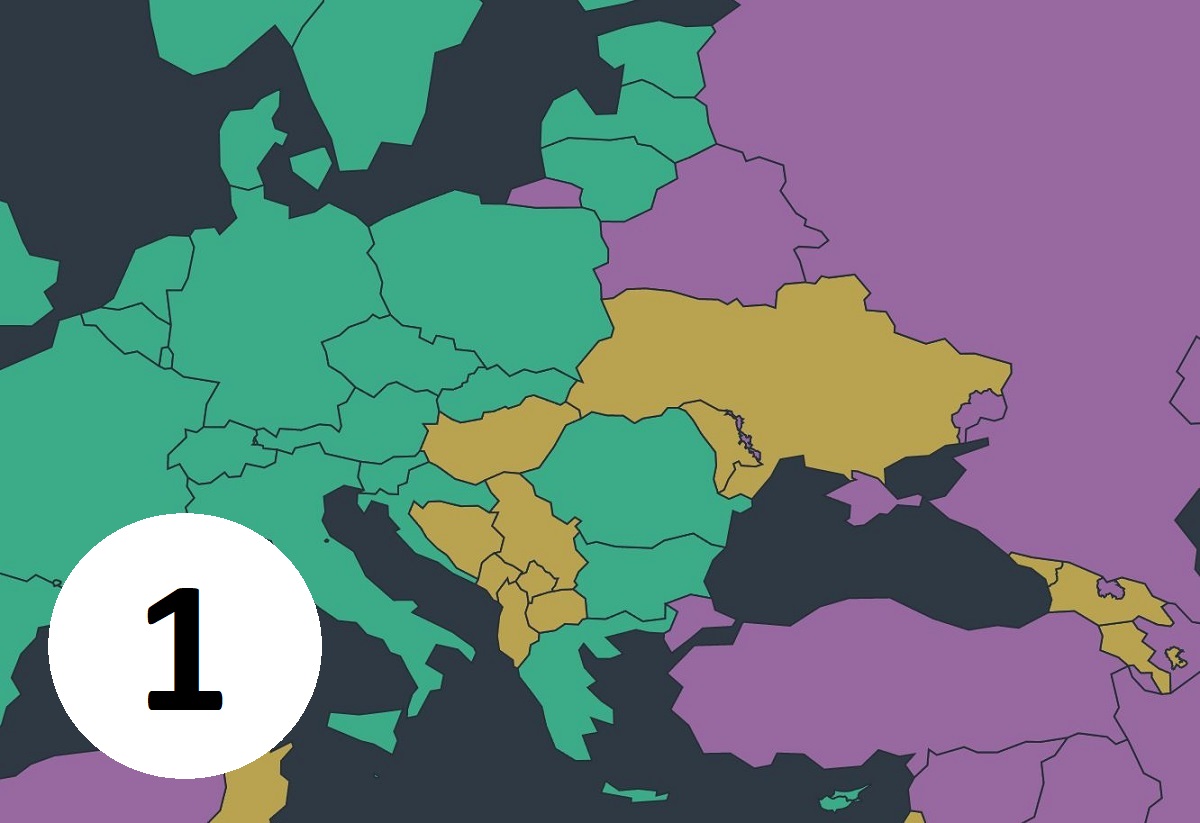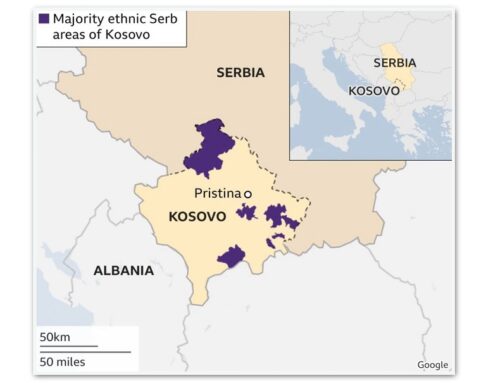In Southeastern and Central-Eastern Europe, states are merely considered to be ‘Transitional or Hybrid regimes’ or ‘Semi-consolidated democracies’, according to the Freedom House’s democracy scores. Although most of them are democratic states, Belarus is the only exceptional state marked as a ‘Consolidated Authoritarian Regime’, as its democracy score and democracy percentage are the lowest.
In the analysed period of 15 years, from 2006 to 2021, Economic Intelligence Units’s Democracy Index reports show that some of the states from the mentioned European regions, have had changes in their democracy scores which consequently led to changes of their regime types. This EIU’s democracy index, scaled from 0 to 10, is based on the 60 indicators’ ratings, grouped into five categories: electoral process and pluralism; civil liberties; the functioning of government; political participation; and political culture. Whenever a state experiences changes in any of these categories, its democracy index rises or decreases. Depending on how big of a democracy index change is, a state can go from one to another regime type category. Simply put, if a state’s ratings decrease in the above-mentioned 5 categories, its democracy index also increases and the state can lose its status of a ‘Flawed democracy’ and downgrade to the label of a ‘Hybrid regime’.
Main purpose of this article is to analyse possible reasons of MOSO states’ fluctuations in the regime categories. This article will mostly focus on the EIU’s Democracy Index 2006-2021 report, but Freedom House’s democracy score reports will also be taken into consideration. This analysis will be done for the separate regions and not for the each MOSO state individually, in order to preserve the length of the article to a reasonable extent.
Starting from the Western Balkans states, both Freedom House and EIU’s reports show that there were no extreme or significant changes in states democracy indexes and scores. The only state that changed its status of a ‘Hybrdi regime’ into a ‘Flawed democracy’, as EIU shows, is Albania. This change occured in 2020, when Albania’s overall score went above 6.0. In this year, Albania practically implemented some of the OSCE’s recommendations for electoral reforms. Thus, that year in the elections, certain novalities were intorduced into the voting process. Also, compared to previous years Albania’s justice reform progressed, as the Appeal Chamber consolidated judical review process practices but some judical institutions failed to restore public trust in them. Despite the fact that Albania didn’t make much progress concerning civil liberties, independent media, corruption and the like, by March 2020 it met all of the EU’s preconditions for the accession process, which made the European Union to call on other Member States to give a greenlight for the the first intergovernmental conference with the aim to officially start accession talks with Albania.
Other Southeastern European states, namely Bulgaria, Moldova, Greece and Romania have had some changes in their democracy scores, and thus in their regime type lables, according to the EIU and Freedom House reports. Although Greece was left out from the Freedom House analysis, the EIU’s reports show that Greece experienced a decrease in its overall democracy index score between 2008 and 2010, which led to its downgrade from a ‘Full democracy’ to a ‘Flawed democracy’. One of the possible explanations for such a change lies in the Greek economic crisis, which only showed all of the flaws of the Greek government and its political culture.
Generally speaking, as explained in the EIU’s Demovcracy Index 2010 report economic crises can threaten democracy, usually with a lag, through increased social unrest and historically, economic crises and difficulties have been associated with democratic breakthroughs, like the sudden collapse of seemingly stable autocratic regimes as well as with the increasing authoritarianism but in case of Europe, because of the combination of many other factors, this crisis had a negative impact on democratisation.[1] Moldova, on the other hand, changed its category of a ‘Flawed democracy’ into a ‘Hybrid regime’ in 2017. One of the possible reasons for such a decline is actually a combination of the controversial set up of a new government government, ”billion-dollar theft” scandal in the banking industry that left Moldova’s banks extremely fragile, appointment of compromised individuals to main positions in the law enforcement bodies and other similar issues that caused an extended mistrust of Moldovan public.
In the category of Central and Eastern European states, only Belarus is marked as an authoritarian state, by both EIU and Freedom House and it is also the only state of the whole MOSO region with such a label. In the last three years of the analysed period, Belarus’ overall democracy score even declined, by around 0.5, as EIU’s report shows. There are a few possible explanations for Belarus’ decline in the various rating inidactors and for it’s lowest overall democracy scores in general. In the past three years, Belarus continuously scored high levels of public mistrust, especially in 2020 when Aliaksandr Lukashenka won the fraudulent presidential elections but also during the COVID-19 crisis. Moreover, as Belarus legitimized repression, civil society was controlled to agreat extent, independent media almost vanished because of extreme charges for independent reporting. Also, employment in the state’s institutions was controlled by the president and local executives were assigned to their position based on their support of the president and his ideology. However, in the years before 2019 Belarus’ overall political situation was fairly stable, some efforts were made in the anticorruptive actions which led to a great increase in the criminal corruption cases against politicians and businessmen, Belarusian officials and its institutions were very open for cooperation with civil society organisations. As a result of a somwehat stable socio-political situation, Belarus’ overall democracy score was above 3.0. All of the other states that belong to Central or Eastern Europe, as well as any other in the MOSO region are marked as democracies. On the other hand, only Czech Republic, throughout the years had a downgrade from ‘Full democracy’ to ‘Consolidated democracy’ label. Decrease in its overall democracy score happened in 2014, as a result of a decline of the public trust in political parties and institutions because of the generally unstable political environment and rise in the corruption. Other states analysed had no drastic changes in their regime types, meaning that they didn’t have any extreme changes in the rating indicators like election system, civil liberties, overall the functioning of government, political participation and political culture.
Lastly, all of the Baltic states – Latvia, Lithuania and Estonia, preserved their ‘Flawed’ or ‘Consolidated’ democracy labels. Generally speaking, their overall democracy scores remained in the range of 7.0 in the period between 2006 and 2021. Estonia, however, was closest to becoming a ‘Full democracy’ in 2018 and 2019. Its high democracy score of 7.90 happened because its National Democratic Governance rating improved after the change of government in 2016, also becuse of the improved Local Democratic Governance rating becuase of the complex administrative-territorial reforms and because of the rise in the Corruption rating after numerous official and parties’ representatives were prosecuted for corruption in a timely manner. Other two states, Latvia and Lithuania, had some declines in their overall democracy scores, according to the EIU. This decrease happened for both of the states because of the similar reason – problematic decisions regarding migrants’ asylum and movement rights, which affected their Judical Framework and Independence ratings.
Source:
[1] chrome-extension://efaidnbmnnnibpcajpcglclefindmkaj/https://www.eiu.com/Handlers/WhitepaperHandler.ashx?fi=Democracy_Index_2010_Web.pdf&mode=wp&campaignid=demo2010


